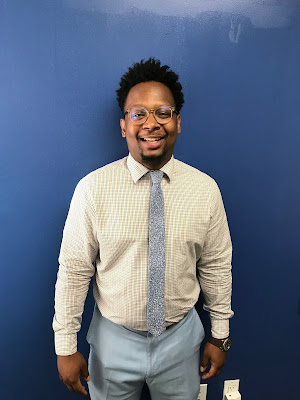New Mentoring Program Works with Young Men
Bronx Community Solutions launched a young men's mentoring group. The group will allow Bronx Community Solutions clients the chance to participate in roundtable discussions with male mentors who are leaders in the community, and share meaningful stories of their own struggles and how they can best support each other. In this Q&A, Youth Justice Coordinator Justin Briggs discusses Bronx Community Solutions and the young men's mentoring group.
 |
| Youth Justice Coordinator Justin Briggs |
How did you come to work for Bronx Community Solutions and how have you grown in the job?
Briggs: I came to Bronx Community Solutions as an intern through a program called AmeriCorps. At that time, I was attending a high school equivalency prep course with another agency. A Bronx Community Solutions staff member called my case manager and asked if he had anyone for this great internship opportunity that would provide a stipend and an educational award that could be used for any type of schooling. He immediately thought of me and presented the opportunity. I didn’t want to do it at first because the internship was in a criminal court and I was concerned about losing my “street cred”. I was 19 years old and just getting my priorities together, so taking the opportunity was the beginning of challenging myself for change.
Briggs: I came to Bronx Community Solutions as an intern through a program called AmeriCorps. At that time, I was attending a high school equivalency prep course with another agency. A Bronx Community Solutions staff member called my case manager and asked if he had anyone for this great internship opportunity that would provide a stipend and an educational award that could be used for any type of schooling. He immediately thought of me and presented the opportunity. I didn’t want to do it at first because the internship was in a criminal court and I was concerned about losing my “street cred”. I was 19 years old and just getting my priorities together, so taking the opportunity was the beginning of challenging myself for change.
So,
I decided to take on the internship and during that 2-year period I got involved
in almost every department Bronx Community Solutions had at the time Intake, Clinic, and Community
Service Cleanup Crew. When my internship was over, I applied for an intake
position and became an official employee. I've grown tremendously since first
starting at Bronx Community Solutions. I developed professionalism, more maturity, and a new huge understanding
of people, how no one is perfect and we are all a work in progress.
What led you to start a mentoring program for
young men?
What led me to
start a mentoring program for young men was having that understanding of people
being a “work in progress”. Me being able to identify a time and place of being
a young man and not understanding how important progress is and how we can
evolve by working on ourselves; building and defining our character. Growing up
in NYC in an urban environment showed me a lot regarding the way society views
young men of color and how much we ourselves add to stereotypes or negative
perceptions. The goal is not to change the thought process, but add to the
thought process and hopefully what is added can help them find a balance so
they can make better life defining choices.
Do
you have any individuals in your life who you consider to be a mentor/role
model? If so who are they and how have they played a positive role in your
life?
Well my first
mentor/role model was my mother. Being a single woman of color and dealing with
certain struggles while at the same time instilling education and culture in
me. She always encouraged me to be better than the struggles around me and not
to end up “another statistic”. I have two older brothers that got involved in
the streets, so where she felt she went wrong with them, she wanted to do right
with me. My brothers also ended up being my role models. My oldest turned his
life of drug dealing into becoming a business man. Now he owns a barber shop
and is opening a juice bar in Albany. My second oldest brother introduced me to
hip hop and fashion. The whole matching thing I do with my clothes is
influenced by my second oldest brother. He was an aspiring rapper and
influenced me to write and express myself through poetry when I was growing
up.
What
is your long-term vision for the mentoring group?
I want to get men
of color who has dealt with struggle and turned it into success to come in and
have a group discussion. Having the youth see people that come from overcome
their struggles and make something good out of it can have a powerful impact.
Since I mainly work with the male population I feel that helping to influence
them in a positive way can have a ripple effect on the community.
What
are the requirements for participating? In addition to gaining a mentor, what
other benefits will your clients gain by becoming a part of the group?
The clients will
hopefully gain a sense of identifying what “masculinity” looks like, the role
they play being a man in their family and community, and identifying resources
that they can benefit from for employment, support and education.
Comments